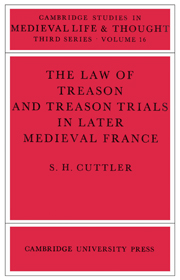Book contents
- Frontmatter
- Contents
- Dedication
- Preface
- Abbreviations
- Introduction
- 1 THE CONCEPT OF TREASON IN LATER MEDIEVAL FRANCE: LEGISTS, ‘COUTUMIERS’ AND TREATISE-WRITERS
- 2 THE CRIMES OF TREASON
- 3 JURISDICTION
- 4 PROCEDURE AND THE TRIAL OF PEERS
- 5 PUNISHMENT, FORFEITURE AND PARDON
- 6 TREASON AND THE CROWN 1328–1356
- 7 TREASON AND THE CROWN 1356–1380
- 8 TREASON AND THE CROWN 1380–1422
- 9 TREASON AND THE CROWN 1422–1461
- 10 TREASON AND THE CROWN 1461–1494
- Conclusion
- Bibliography
- Index
2 - THE CRIMES OF TREASON
Published online by Cambridge University Press: 13 October 2009
- Frontmatter
- Contents
- Dedication
- Preface
- Abbreviations
- Introduction
- 1 THE CONCEPT OF TREASON IN LATER MEDIEVAL FRANCE: LEGISTS, ‘COUTUMIERS’ AND TREATISE-WRITERS
- 2 THE CRIMES OF TREASON
- 3 JURISDICTION
- 4 PROCEDURE AND THE TRIAL OF PEERS
- 5 PUNISHMENT, FORFEITURE AND PARDON
- 6 TREASON AND THE CROWN 1328–1356
- 7 TREASON AND THE CROWN 1356–1380
- 8 TREASON AND THE CROWN 1380–1422
- 9 TREASON AND THE CROWN 1422–1461
- 10 TREASON AND THE CROWN 1461–1494
- Conclusion
- Bibliography
- Index
Summary
The English Statute of Treasons, promulgated in 1352, did not have a counterpart in France. This is not to say, however, that there was no French legislation at all: from time to time, as we shall see, the kings of France did indeed publish various kinds of documents, having the force of law, that clarified contentious issues or created precedents. But for the most part, in the absence of a fundamental piece of legislation comparable to the English Statute of Treasons, French royal officials used the adopted Roman laws – the lex Julia maiestatis and the lex Quisquis– and made their own constructions upon them.
Regicide was obviously the gravest of all treasons. Although all the French kings of the later middle ages died in their sick-beds, in one instance, the death of Philippe IV, charges of criminal responsibility were brought against two of the late king's principal officers: Pierre de Latilly, bishop of Châlons and chancellor of France; and Raoul de Presles, advocate-general. Unfortunately, little is known about this affair. It is clear enough, though, that the accusation was groundless and had proceeded from the enmity of their political opponents, chief of whom was Charles de Valois. De Presles was released in September 1315 for lack of evidence; and the bishop, after a long and desultory trial conducted by ecclesiastical justice that had not finished in 1318, was also released, returning to his see by 1320.
- Type
- Chapter
- Information
- Publisher: Cambridge University PressPrint publication year: 1982

